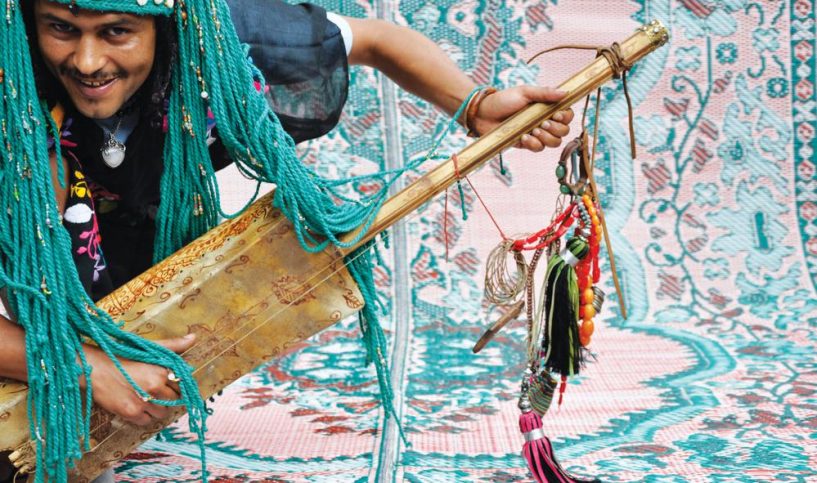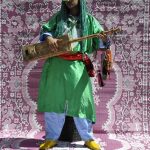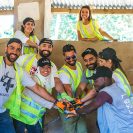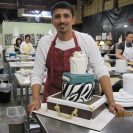Simo Lagnawi plays Gnawa music, which is both a prayer, and a celebration of life. It is a traditional form of Moroccan music the roots of which can be traced to sub-Saharan Africa.
If you dropped by REUSE 5.0 in April you will have experienced Simo performing – and it really is an experience! Gnawa is not only music but can be used as a trance-inducing cleansing ritual. He plays the traditional forms of Gnawa but is also pushing the envelope by performing and recording fusions with jazz, reggae, trip-hop, folk and funk. This helps him explore his musical passions whilst finding a wider audience for the traditional Gnawa music he loves so much.
How did your musical journey begin?
My Family is musical. I remember when I was very young, my sisters, brothers, my mother, aunt, and friends would always get together and play popular music. My father used to take us to the Berber region where he was born, and we would watch the Ahawash – the traditional music from our roots. When I was 13, I began playing popular music professionally.
What/Who inspires you to compose your music?
I was inspired by lots of different music from everywhere I’ve lived, and traveled to in Morocco.
I am inspired by the great Gnawa Masters; Maalem Sam, Maalem Hamida Boussou, Maalem Bakbou Aziz, Maalem Abdel Latif El Marzoumi, Maalem Ahmed Bakbou, Maalem Mahmoud Guinia, Maalem Mustapha Bakbou, Maalem Abdel Kadar Amlil, Maalem Omar El Hayat, Maalem Azuz Sudani, there are many more…
Why did you choose Gnawa music?
Gnawa music chose me.
Tell us a little about the instruments you play.
Gnawa music and its instruments came from sub-Saharan Africa many years ago. It was brought there by Black African slaves and tradespeople. The Guembri (also called Sintir or Hajhouj) has a camel skin neck, three goats gut chords, and is carved out of a tree trunk. It uses pentatonic melodies. Krakabs are metal castanets which create the sound of horses. They symbolize the handcuffs of the slaves. The tubl (large goatskin drum) beats out the messages and instructions for the dance. The percussion, call and response singing, and movements of the dance developed similarly to the blues. The dance represents freedom.
What are some of the challenges of performing Gnawa music?
My challenge is that I have to play alone; I don’t have lots of percussionists to play with me like in Morocco. I need to sing all the song, dance, and create the percussion with krakabs, Guembri and bells on my ankles – and the explanation. In a traditional ‘Lila’ the maalem (master musician) needs to continue the music as long as it takes until the person experiencing the trance has finished. Sometimes this can take a long time, you need stamina.
Is the final sound of a musical track an individual or group effort?
Traditionally a track would include the guembri, krakabs, and singing led by the maalem, and response from the krakab players (soyos). However, I have recorded an album alone with just my singing and the guembri. It’s not for sale online yet! Also I make tracks alone but layer the other instruments on top, to create a track which sounds like there are lots of people playing.
In your opinion, what was the hardest challenge you faced in your musical career so far?
When I came to the U.K not many people knew about Gnawa music – having already built up my career in Morocco, I had to begin, again.
How has the rest of the world reacted to your sound?
Lots of people love it. They feel it is very powerful and they feel energized and peaceful.
Do you feel that music should always serve a specific purpose?
I think every kind of music does serve a purpose whether it is for relaxing, for expelling aggression, reaching a spiritual elevation, or just to enjoy.
What are some of your favorite tracks, and why?
I like all kinds of World Music. I love Milhoun music from Morocco as it has wise messages for life.
Ali Farka Toure’s track Ai Du – lovely, simple, African Blues style.
What is your dream performance space and destination?
I want to play to the Queen of England in Buckingham Palace.
What would you like to accomplish in the future?
I want people to know about Gnawa music from Morocco and the Great Masters. I want to play traditional Gnawa and my Gnawa fusion music all over the world.
Will you be visiting Kuwait again soon?
If I’m invited I would love to come back again. Lovely people!
To listen to Simo’s music and for more information, visit www.myspace.com/simolagnawi
All images: Hassan Hajjai, courtesy Projects of Rose Issa.









